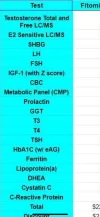Ah, simpler than that.
This is not a complicated process, so there is no need to complicate it.
(1) Which hormones are not so important - I know, heresy. You just need a hormone signal to tell your body to hang on to muscle. Most of the choice of hormones you see on sites like this one or from bodybuilders have to do with getting rid of water at the end of the cutting in preparation for being on stage. That really does not have anything to do with the cut itself. I have started a cut on testosterone and deca, because I did not care about water at the commencement of the cut. I just cared about a hormone signal to the muscle while I went about cutting the fat.
(2) You need intense resistance training.
(3) You need sufficient protein.
Protein, training, and hormones (three things) tell your body to hold on to muscle even while calories decrease. Don't pull any of these three legs out from your three legged stool.
Then weigh or measure and track everything you eat and drink, consistently, every day. Get your calories set on a certain level and stay there for a week. Keep protein high, fats low, and adjust the carbs as needed. The amount of carbs at the start is not too terribly important, but get sufficient carbs for the first week.
Progress measuring tools - 2 or 3: Measuring tape around the waist, up by the bellybutton (not down where your pants sit), and weight on the scale (in the morning after peeing before eating or drinking). If you want to really see the difference in real time, add a third thing, photos of mandatory poses in good lighting.
At the end of one week step on the scale.
Did your weight increase, decrease, or stay the same? If it decreased 1.5-2 pounds change nothing and go another week.
If it stayed the same, pull some carbs and/or add a little cardio. Nothing drastic. Make small changes. You are looking for a trend of maybe 1.5-2 pounds weekly.
Pulling carbs - a little at a time. If you hold carbs stead each day, then it is easy to pull small amounts of rice or potatoes from each meal. Keep carbs around workout time if you have to decide to pull more from certain meals at some point. If you cycle carbs, all that is important is the weekly carb count and calorie count. You can still have some high days in the cycle, just make sure that you adjust carbs in your cycle for the one week period so that the number goes down for the week (if an adjustment is needed because you did not drop weight that week).
Cardio - a good idea no matter what. You can add days, add duration, increase the intensity. Cardio gives you another variable to play with. No need to go crazy with it at first.
If your weight went up, don't panic. Just take a look at your diet and cardio and decide what small changes to make. Do not make major changes week to week. They will add up to major changes over the next 12-16 weeks.
Also, be aware of water weight if you have been off of all hormones and are just starting them. It is normal to add a few pounds of glycogen and water right at the start.
If you lost more than 2 pounds, consider adding some carbs back in each day to slow down your process. You cut too many or are doing too much cardio or both.
If you added weight or stayed the same but your measuring tape objectively tells you that your waist is significantly smaller, then change nothing, as your progress is still going in the right direction. Photos can be useful in making this determination as well.
Stay on a general trend of 1.5-2 pounds a week.
Adjust nutrition and cardio as needed. Keep protein high <--- this by itself means a lot of food, eggs plus 2 or 2.5 pounds of meat.
In order to keep fats low you may need to substitute some things you normally eat. For instance, cheeseburgers are not going to be on the menu daily. LOL. Eggs in the morning, whereas you might have been eating 6-8 eggs, you are going to need to decrease the number of eggs (fat in the yolks) and add egg whites as a replacement to get the protein back up to around 50 grams for breakfast (as it should be up around there at every meal).
Resist the urge to fill the protein requirement with whey protein shakes, but if there is going to be a gap in your daily nutrition one day due to travel or whatever, by all means it is better to drink a shake than go without the protein. But plan your meals and pack them with you and you will find this is rarely the case. I only really use the stuff for something at the end of a workout or to fill a gap due to travel or other stuff getting in the way of meals.
Small tweaks each week and only as needed. Keep your weight training intensity up.
It is really, really simple to do, but harder to implement because beer and cheeseburgers are awesome.
I highly recommend the photos in mandatory poses and good lighting (in addition to weighing and a tailor's tape around the waist at the belly button area) because they will reveal your condition with no BS or excuses or flattery, and you can compare the progress you are making from the beginning to the end.


